Foods Linked to Illness
Some foods are more associated with illnesses than others. They can carry harmful germs that can make you very sick if the food is contaminated. Raw foods of animal origin are the most likely to be contaminated, specifically raw or undercooked meat and poultry, raw or lightly cooked eggs, unpasteurized (raw) milk, and raw shellfish. Fruits and vegetables also may get contaminated, either in the field, during processing, or during other stages in the food production chain, including through cross-contamination with raw meat in home or restaurant kitchens.
Learn more about which foods are associated with foodborne illness, and steps you can take to avoid food poisoning:
Raw Poultry and Meat
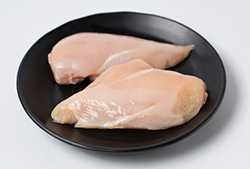
Most raw poultry contains Campylobacter. It also may contain Salmonella, Clostridium perfringens, and other bacteria. Raw meat may contain Salmonella, E. coli, Yersinia, and other bacteria.
You should not wash raw poultry or meat before cooking it, even though some older recipes may call for this step. Washing raw poultry or meat can spread bacteria to other foods, utensils, and surfaces, and does not prevent illness.
Thoroughly cooking poultry and meat destroys germs.
You can kill bacteria by cooking poultry and meat to a safe internal temperature. Use a food thermometer to check the temperature. You can’t tell if meat is properly cooked by looking at its color or juices. Leftovers should be refrigerated at 40°F or colder within 2 hours after preparation. Large cuts of meat, such as roasts or a whole turkey, should be divided into small quantities for refrigeration so they’ll cool quickly enough to prevent bacteria from growing.
Learn More:
- CDC Features
- Infographics
- FoodSafety.gov
Fruits and Vegetables
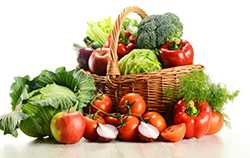
Eating fresh produce provides important health benefits, but sometimes raw fruits and vegetables may contain harmful germs such as Salmonella, E. coli, and Listeria. Fresh fruits and vegetables can be contaminated anywhere along the journey from farm to table, including by cross-contamination in the kitchen. Safer choices for fresh produce are washed vegetables and fruit, including salads, and cooked vegetables.
Learn More:
- CDC Feature: Fruit and Vegetable Safety
- Infographic:
- FoodSafety.gov: Fresh Fruits, Vegetables, and Juices
Raw Milk, Cheese, and Other Dairy Products
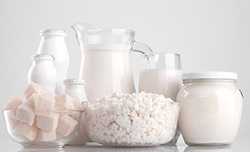
Raw milk and dairy products made from it (including soft cheeses, ice cream, and yogurt) can carry harmful germs that can make you very sick. These germs include Campylobacter, Cryptosporidium, E. coli, Listeria, and Salmonella.
Raw milk products are made safe through pasteurization, which requires just enough heat to kill disease-causing germs. Most of the nutritional benefits of drinking raw milk are also available from pasteurized milk, without the risk.
Although Listeria infection is very uncommon, pregnant women and older adults have a much greater chance of getting it than other people. A Listeria infection often has severe effects on older adults, fetuses and newborns. To prevent listeriosis, don’t consume raw milk and soft cheeses and other dairy products made from unpasteurized milk.
Learn More:
- CDC Feature: Raw (Unpasteurized) Milk
- Infographic: Raw Milk Know the Facts [PDF – 1 page]
- FoodSafety.gov: Milk, Cheese, and Other Dairy Products
- People at Risk – Pregnant Women and Newborns (Spanish)
Raw Eggs

Eggs can contain a germ called Salmonella that can make you sick, even if the egg looks clean and uncracked.
To avoid food poisoning, take these steps when preparing eggs:
- Cook eggs until the yolks and whites are firm.
- Cook foods containing eggs thoroughly.
- Keep eggs refrigerated at 40°F or colder.
- Do not taste or eat raw batter or dough.
Learn More:
- CDC Feature: Salmonella and Eggs
- FoodSafety.gov: Eggs and Other Egg Products
Raw Shellfish
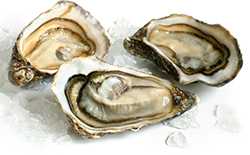
Oysters and other filter-feeding shellfish can contain viruses and bacteria. Raw or undercooked oysters can contain Vibrio bacteria, which can lead to an infection called vibriosis. Oysters harvested from contaminated waters can contain norovirus, which causes vomiting and diarrhea. To avoid food poisoning, cook oysters well.
Learn More:
- Vibrio and Oysters
- CDC Feature: Oysters and Vibriosis
- FoodSafety.gov: Seafood
Raw Flour
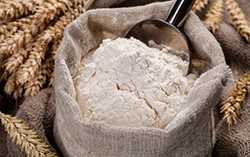
Flour is typically a raw agricultural product that hasn’t been treated to kill germs. Harmful germs can contaminate grain while it’s still in the field or at other steps as flour is produced. Bacteria are killed when food made with flour is cooked. That’s why you should never taste raw dough or batter.
Learn More:
- CDC Feature: Say No to Raw Dough!
- FoodSafety.gov: Flour, Raw Dough, and Raw Batter
Sprouts
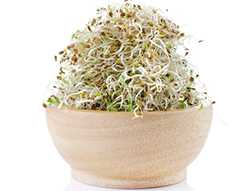
The warm, humid conditions needed to grow sprouts are also ideal for germs to grow. Eating raw or lightly cooked sprouts may lead to food poisoning from Salmonella, E. coli, or Listeria.
Thoroughly cooking sprouts kills the harmful germs and reduces the chance of food poisoning.
Learn More:
- CDC Feature: Fruit and Vegetable Safety
- FoodSafety.gov: Sprouts: What You Should Know
- Page last reviewed: July 28, 2017
- Page last updated: August 31, 2017
- Content source:


 ShareCompartir
ShareCompartir